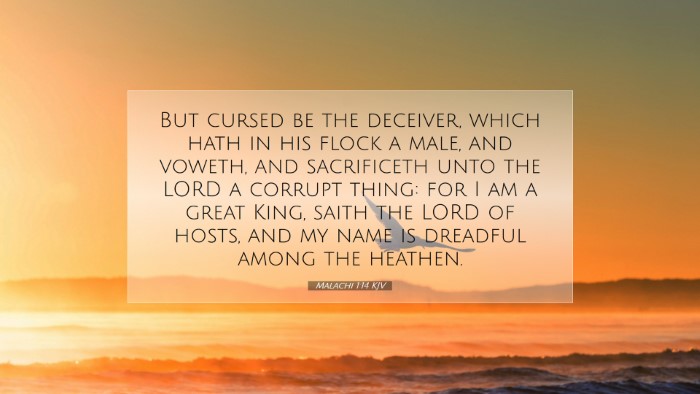Old Testament
Genesis Exodus Leviticus Numbers Deuteronomy Joshua Judges Ruth 1 Samuel 2 Samuel 1 Kings 2 Kings 1 Chronicles 2 Chronicles Ezra Nehemiah Esther Job Psalms Proverbs Ecclesiastes Song of Solomon Isaiah Jeremiah Lamentations Ezekiel Daniel Hosea Joel Amos Obadiah Jonah Micah Nahum Habakkuk Zephaniah Haggai Zechariah MalachiMalachi 1:14
Malachi 1:14 KJV
But cursed be the deceiver, which hath in his flock a male, and voweth, and sacrificeth unto the LORD a corrupt thing: for I am a great King, saith the LORD of hosts, and my name is dreadful among the heathen.
Malachi 1:14 Bible Commentary
Malachi 1:14 Commentary
Verse Text: "But cursed be the deceiver, which hath in his flock a male, and voweth, and sacrificeth unto the Lord a corrupt thing: for I am a great King, saith the Lord of hosts, and my name is dreadful among the heathen."
Introduction
The book of Malachi serves as a prophetic critique and a call to reform among the Israelites after their return from exile. In this particular verse, Malachi addresses the issue of insincerity in worship, specifically condemning those who offer substandard sacrifices to God while pretending to honor Him. This commentary draws from the insights of Matthew Henry, Albert Barnes, and Adam Clarke to provide a deeper understanding of Malachi 1:14.
Contextual Background
Malachi lived during the post-exilic period when the Temple had been rebuilt but spiritual decline was evident among the people. The Israelites had fallen into a pattern of ritualistic worship that lacked genuine devotion. These issues reveal the heart of God's concern through Malachi, emphasizing the nature of divine worship and the standards expected from His people.
Key Concepts
- Covenantal Responsibility: The priests and people are reminded of their covenant obligations to bring offerings that reflect their love and reverence for God.
- Integrity in Worship: The verse highlights the importance of offering not just anything, but that which is valuable, as true worship requires integrity.
- God’s Holiness and Sovereignty: The phrase "I am a great King, saith the Lord of hosts" emphasizes God's majesty and the reverence deserved in worship.
Commentary Insights
Matthew Henry
Henry emphasizes the weightiness of the curse pronounced upon the “deceiver.” He notes that God views these acts of deception as directly offensive to His holiness, suggesting that such offerings represent a deeper heart issue among the people. For Henry, the requirement for a "male" offering signifies God's expectation of the best, and in failing to meet this, the people exhibit a lack of respect for Him as the Supreme Being.
Albert Barnes
Barnes provides an analysis of the term “deceiver,” linking it to those who are deceitful in their worship toward God. He suggests that this attitude not only insults God but also reflects poorly on the individual's relationship with the Lord. Barnes underscores the notion that God’s greatness should evoke a profound respect in the hearts of His worshippers, leading them to present offerings that are befitting of His divine nature.
Adam Clarke
Clarke sheds light on the implications of offering “corrupt” sacrifices and draws attention to the spiritual ramifications of negligence in worship practices. He interprets the passage as a call to accountability, reminding worshippers that God is worthy of the utmost care and respect in their offerings. Clarke’s perspective reinforces the idea that God’s name is "dreadful among the heathen," indicating that the improper worship of Israel tarnishes God's reputation among the nations.
Theological Implications
This verse presents significant theological implications regarding God's expectations of His people in their worship. The condemnation of offering the "corrupt" brings to light the seriousness of sacrificial practices and the true heart behind them.
Integrity in Sacrifice
Modern applications of this verse can be seen in how churches continue to understand and practice worship. Just as God demanded quality offerings in Malachi’s time, contemporary worshippers are called to examine their motivations, ensuring they offer themselves and their resources in a way that honors God.
Understanding God’s Holiness
God’s declaration as a “great King” serves as a reminder of His supreme authority and holiness. This aspect of God’s character encourages believers to approach Him not just with familiarity but also with awe. A proper understanding of God's holiness ought to drive worshippers towards a greater commitment to offering their best.
Conclusion
In summary, Malachi 1:14 serves as a powerful admonition against half-hearted worship. Through the insights of Henry, Barnes, and Clarke, this verse illuminates the serious nature of God’s expectations regarding offerings, integrity, and the sincere pursuit of holiness in worship. As pastors, students, and theologians reflect on this passage, they are reminded of the call to maintain reverence in their relationship with God and to seek His glory above all else.


